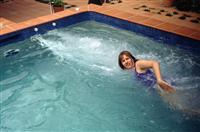Sports and Exercise Psychology
 Individuals will usually specialise in either sports or exercise. It is rare to practice in both. Sports psychologists work with sports men and women across teams and individual sports, both amateur and professional. They aim to prepare athletes psychologically for competition and enable them to deal with both competition and training. They may help athletes to deal with the stressful and demanding aspects of their professional, help coaches build team cohesiveness, help athletes deal with the emotional consequences of injuries and so on. Exercise psychologists are mainly interested with the application of psychology to exercise participation and motivating the general public. This may include encouraging people to see the benefits of exercise, encouraging individuals to set goals.
Individuals will usually specialise in either sports or exercise. It is rare to practice in both. Sports psychologists work with sports men and women across teams and individual sports, both amateur and professional. They aim to prepare athletes psychologically for competition and enable them to deal with both competition and training. They may help athletes to deal with the stressful and demanding aspects of their professional, help coaches build team cohesiveness, help athletes deal with the emotional consequences of injuries and so on. Exercise psychologists are mainly interested with the application of psychology to exercise participation and motivating the general public. This may include encouraging people to see the benefits of exercise, encouraging individuals to set goals.
Typical Jobs or Career Paths
Sports and exercise psychologists will work in a range of sports and exercise sectors and work with a range of clients. Sports psychologists will generally combine consultancy work with research or psychological consultancy in other areas, eg. Clinical psychology. Some sports psychologists may hold positions within government organizations or national governing bodies for sports. The opportunities to work full time as a sports psychologist are increasing in number.
Exercise psychologists have similar opportunities. They may work in consultancy with teaching and research careers. Much of their work may require referrals from doctors, and setting up and evaluating exercise programmes in prisons, employment and psychiatric situations. There may also be consultancy work within an office or at competition venues, clinics, recreational settings and so on. Sports and Exercise psychologists will usually require a degree and further qualifications to work in this field. They make take a specific Sports Psychology degree or take a generic psychology degree followed by further qualification in Sports psychology. Experience is also very important.
Who Employs a Graduate?
Typical employers may include –
- Government organizations
- National Sporting bodies
- Colleges
- Health Services
- Private Practice
Positions are usually available part and full time and on a temporary or permanent basis. Many exercise and sports psychologists will hold two or more positions.
Remuneration and Advancement Opportunities
Pay is variable, depending on whether the individual works with amateurs or professionals. Many will combine consultancy work with teaching and lecturing.
Professional Bodies
Membership of Professional bodies is useful to encourage networking and that you are kept up to date with current trends.Some will require an annual fee to join, whilst others will require evidence of your educational attainment and experience. Some will offer reduced fees for students. Organizations include –
American Psychological Association - Sports Division http://www.psyc.unt.edu/apadiv47/
Association for the Advancement of Applied Sport Psychology (AAASP) http://www.aaasponline.org
North American Society for the Psychology of Sport and Physical Activity (NASPSPA) http://www.naspspa.org
International Society of Sport Psychology (ISSP) http://issponline.org
British Association of Sport and Exercise Science (BASES) http://www.bases.org.uk
British Psychological Society
www.bps.org.uk
The Association of Educational Psychologists www.aep.org.uk
British Association of Counselling and Psychology www.bacp.co.uk
Australian Counselling Association www.theaca.net.au
Career Risks
There are risks associated with every careers. Working in this sort of competitive situation can be stressful and demanding, as can be working with people with psychiatric difficulties.However, you would be trained to deal with those sorts of situations and would often receive supervisory support to deal with any emotional or stressful difficulties you may face.
Recommended Courses
Knowledge and experience is important, so ACS offer introductor courses in sports psychology and psychology generally, that you may find a useful introduction to further study; or a supplement to prior studies.
Sports Psychology http://www.acsedu.co.uk/courses/product.aspx?id=363
This subject has 8 lessons as follows: introduction, psychological traits of successful athletes, state of mind, motivation, aggression, leadership and coaching, team dynamics, special groups.
Advanced Certificate in Psychology
http://www.acsedu.co.uk/courses/product.aspx?id=472
The course is divided into 9 modules/subjects as follows: 2 x Core (compulsory)
Modules: Introduction to Psychology, Psychology and Counselling and six elective modules from - Industrial Psychology, Educational Psychology, Sports Psychology, Child Psychology, Biopsychology I, Marketing Psychology,Conflict Management, Research Project 1 plus Industry experience 100 hours. This Advanced Certificate is accredited through the International Accreditation and Recognition Council.This course can be counted towards credit for higher qualifications with ACS Distance Education, WarnboroughUniversity and other ACS affiliate institutions.
Associate Diploma in Psychology
http://www.acsedu.co.uk/courses/product.aspx?id=441
This course is different and unique, allowing you to gain a solid and broad base foundation in theoretical psychology at the same time as developing a variety of practical skills that will be useful in the workplace.
Graduates are not psychologists (A psychologist needs higher university qualifications), but they will have a capacity to apply psychology in real life situations (eg. as a manager, a counsellor, a marketer or a consultant).
The course is divided into 15 modules. Seven compulsory modules must be undertaken by all students, and eight electives can be selected from a range of options listed below. Compulsory modules - Introduction to Psychology, Psychology and Counselling, Counselling Techniques, Industrial Psychology, Child Psychology, Research Project, Industry Meetings (eg. Seminars, conferences) or Work Experience (eg. volunteer counselling). Eight elective modules also need to be chosen.
For details of further ACSDE psychology and counselling courses, visit -
http://www.acsedu.co.uk/courses/product_listings.aspx?catid=Psychology